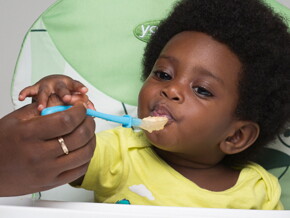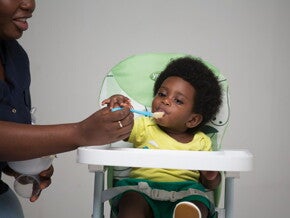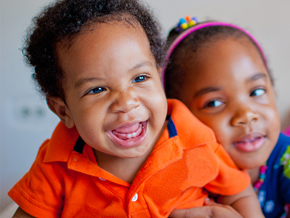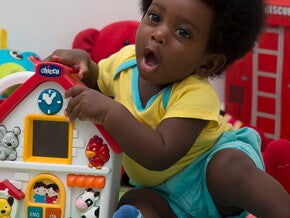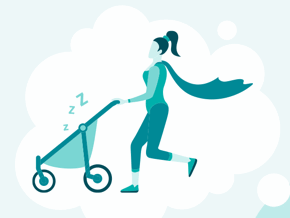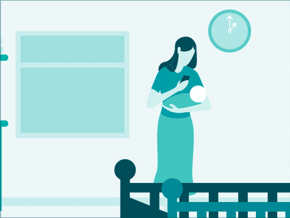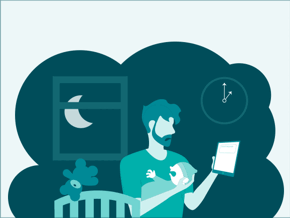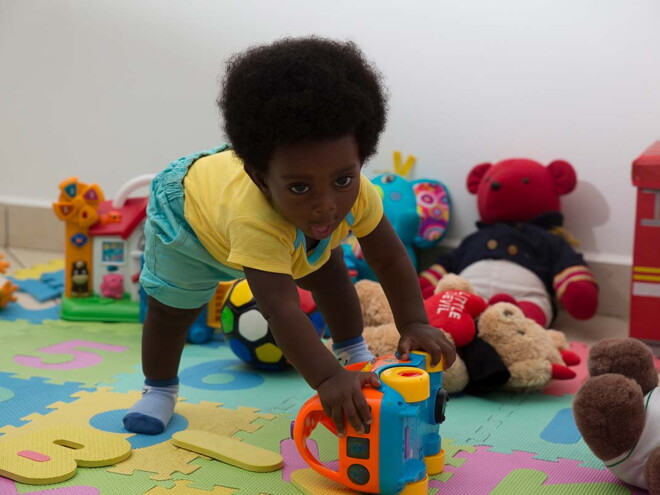
Key Concepts Covered:
Month 10: Master Body Control
Month 11: Make an Expression
Month 12: Strengthen Family Ties
Month 10 - Master Body Control
In case baby separation anxiety works its way back in the mix you can help him adjust to you being away—just be sure to encourage all kinds of snuggles, chats and fun interactions with a wide circle of family and friends.
More ways to coax your baby along?
- Help him stack toys such as blocks, nesting boxes, and clean, empty food containers (No sharp edges, obviously).
- Praise your baby for completing simple tasks. (“Thanks for putting your toys away!”)
- Add pull-toys to the peek-a-boo and fun activity mix.
- Let him play with books (If they’re made of stiff cardboard, that’s even better).
Reaction time! Your baby will probably:
- Become more mobile.
- Handle objects with ease.
- Repeat simple action sequences.
- Pick up blocks and put them in a bucket.
- Roll a ball to you. (Growing social skills!)
- Take more interest in playtime. (Yay!)
- Imitate other people’s actions (yours too, don’t worry).
- Resist being put to bed or left alone (Signs of separation anxiety).
- Remember his favourite song—even laugh and smile when he hears it!
- Express himself with gestures and sounds (as crying’s replacement).
- Use gibberish in a conversational way.
Month 11: Make an Expression
All aboard the Emotion Express! Faster than you can say “Sorry, it’s OK”, instead of cries, your baby will turn to gestures and words to tell you his desires, disappointments, frustrations and more.
He’ll start with a few one-syllable words (like, "bye") and even put multiple syllables together. Next stop? With your help, he could even learn new words, colours, and numbers!
Want him to express himself even more? Try to:
- Talk to him A LOT.
- Listen intently as your baby tries to talk back to you.
- Use gestures, body language and tone of voice to help your baby understand what you’re saying.
- Continue to repeat item names and assign sign language gestures to them (Think MILK, HUNGRY and WELL DONE).
- Make one room safe for baby by removing protential harm and obstacles from his way like hanging wires and tables with sharp edges as much as possible, so he can explore without hearing “No.” (You don’t want to dampen his curiosity!)
- Prepare a "surprise box" with a few safe, interesting items that your baby can discover on his own.
- Rotate the selection of toys in the box, and even move the box from one area to another.
Your baby will continue to impress, he may:
- Begin to stand without assistance (Yes, already).
- Go from a standing to a seated position.
- Begin to recognize the names for different body parts. (“Where’s your nose?”)
- Use baby sign language or repeat actions to get attention.
- Manipulate an object to get it out of a tight space.
- Cry when scolded as he matures emotionally.
Month 12 – Strengthen Family Ties
Don’t look now, but soon your baby will be a toddler! As you look back on your first year together, your little one’s growth, and his attachment to you, will feel like it’s zooming ahead.
Still, his wariness around strangers probably remains and may grow, especially if you’ve returned to work or started his daycare transition. Just be calm, confident and loving to help ease your baby's temporary fears. These consistent responses will boost his confidence until, almost magically, your baby will eventually welcome everyone with a smile.
How else can you and your baby connect?
- Provide plenty of attention.
- Praise his accomplishments.
- Give him an even larger variety of objects to explore.
- Explain everyday activities and describe objects. (Language skills!)
- Point out and name body parts in the bath.
- Name each piece of clothing as you dress your baby.
- Attach a name to each object in the books you read.
- Mention the name of his foods/meals out loud at feeding time.
Look for more signs your baby’s settling in—he may:
- Love to express affection.
- Master the art of the hug and the kiss. (Super cute!)
- Develop an attachment to a "transitional object" or "comfort object" like a teddy or "blankie" (Just another way to soothe himself).
- Explore away from you in a safe environment as his confidence grows.
- Begin to walk steadily without assistance.
- Stack two blocks (or more).
- Scribble on paper.
- Point to images you ask him to identify in a book.
- Expand his one-syllable vocabulary.
- Use consonants, as he begins saying "Mama" or "Dada". (Aw!)
- Imitate animal sounds.
It is recommended to attend all regularly scheduled child welfare clinics visits with health care professionals in the first few years of life.
Another friendly reminder: Babies reach developmental milestones at their own pace. Talk to your doctor if you become concerned about your baby's health or development.

